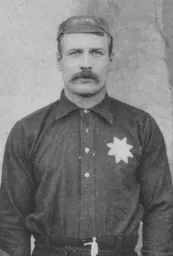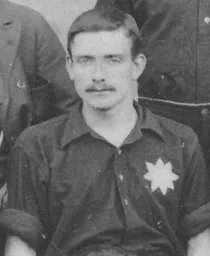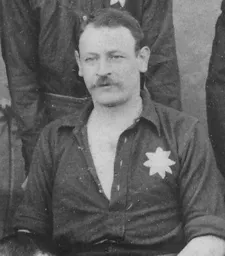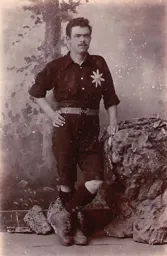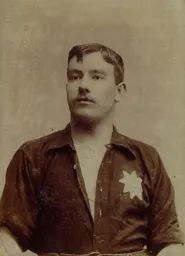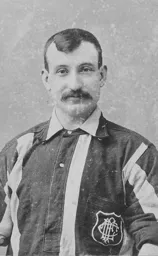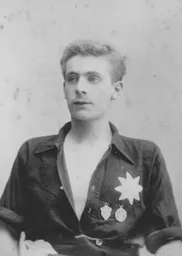The Luton Reporter -
“A stranger visiting the town on Saturday evening would have been at a complete loss to account for a roar of triumph which went up from a large crowd in the centre of the town and even a good many towns-people were unable to explain the outburst of enthusiasm. To the football lover the cheering served as an unmistakable indication that the Luton Town team had once more given a good account of themselves and had qualified for the third round of the qualifying competition for the English Cup. It may, perhaps, be explained that the club was not engaged in the first round, the ninth division (in which Luton is included) containing an insufficient number of clubs. The eight combinations who had entered were accordingly awarded byes, and these were engaged in mimic warfare on Saturday. When the result of the draw for the second round became known fear and dismay fell upon all football loving Lutonians, for it was found that the “reds” had been pitted against the strongest side in the division, the Old Westminsters. The usual predictions as to the probable result of the encounter were made prior to the fray, and these were invariably distinctly adverse to Luton’s chances of success; indeed, the prophets confined their forecasts to the number of goals which would be registered against their players. The chances of the locals were not increased, to say the least, by the fact that they had to play away from home. In anticipation of a goodly number of admirers following the fortunes of the team both railway companies ran excursion trains to London, and a fairly satisfactory use was made of these opportunities to visit the scene of the encounter at Wembley Park. The Midland train was the more largely patronised, upwards of 100 taking tickets. The weather in this early part of the day was not of a very inviting nature, and the lengthy journey was not of the most pleasant description, but the travellers beguiled the time by discussing various interesting football topics—for nobody would be so venturesome as to intrude extraneous subjects upon the attention of enthusiastic partisans of any football eleven. Everything mundane has an ending, and the weary voyages rejoiced that this was the case with the journey to Wembley. The opportunity of rambling about the charming grounds and of inspecting the tower which is to beat the record was, however, sufficient to compensate for any discomfort which had been experienced, to say nothing of the treat in store. The weather had improved somewhat, and the Lutonians were correspondingly jubilant. An inspection of the ground revealed the fact that the rain which had fallen during the morning had had the effect of saturating the turf, though not of rendering it slippery. The footballer’s vocabulary contains many curious terms, and as it is considered nowadays that no account is complete without the introduction of several of these it may at the outset be conceded that the ground was “on the heavy side”.
The start had been announced for 2.45, and a little later the teams took up their position in presence of upwards of 1,000 spectators. A piercingly cold wind swept over the ground, and the lot of the onlookers was the reverse of pleasant. Those who lined the railings, however, did not allow the cold to benumb their partialities, for the applause during the game ranged up in the following order :—Old Westminsters : Goal, *W. R. Moon ; backs, *A. H. Harrison and *R. T. Square (captain) ; half-backs, A. W. Ferrers-Guy, *W. N. Winckworth, and E. G. Moon ; forwards. W. P. Winckworth and J. G. Veitch (right wing), R. R. Sandilands (centre), E. L. Clapham and F. Street (left wing). *International players. Luton Town : Goal, E. Bee ; backs, J. Taylor and J. Wilson ; half-backs, J. Watkins, J. W. Julian (captain), and A. J. Taylor ; forwards, W. Brown and J. Finlayson (right wing), H. Galbraith (centre), F. Allen and J. Dimmock (left wing). The referee was Mr. R. Evans, and the linesmen were Messrs. H. Wetton (Old Westminsters) and W. G. Wheeler (Luton). It will be noticed that Vickers and Hayes were missing from the Luton team. The former had not recovered from the injury which he sustained at Millwall in the previous week, and Hayes had been injured during the week. The “pinks” won choice of positions, and Galbraith started some minutes after the advertised time. The Westminsters went off with a rush, but the Luton defenders returned and the ball went out at the pavilion side. When the “reds” looked like getting near Moon’s goal Guy put himself in evidence and cleared with a terrific kick. The Luton forwards had apparently made up their minds to try their utmost, and a minute later they took the ball up the field by means of some good passing, Allen concluding the run by receiving the sphere when off-side. A little later the old boys had to kick off from their goal-line, the visitors having come unpleasantly close to scoring. Dimmock was showing capital style, and with Galbraith and Finlayson in the pink of condition the Lutonian forward string were giving the opposing half-backs considerable trouble. When they had had a spell in the homesters’ territory, however, Street raced away to the other end and Veitch secured possession, but he found the Town backs too strong for him. Brown experienced extremely hard luck a moment afterwards, a splendid shot from his foot travelling across the Westminsters’ goal in tantalising fashion. Next the home forwards visited Bee’s end and gave a display of neat passing in front of the ex-Arsenal man; in fact, they passed too much and shot too little, and so failed to score. On one occasion Sandilands struck the cross-bar with the ball, but at no time were the “pinks” very dangerous. Hands against the homesters was followed by a corner against Luton off Taylor. Brown shortly afterwards tried Moon with a capital attempt, but the international managed to clear his goal-line. A corner followed, but this was not improved upon. The play was hereabouts in the neighbourhood of the homesters fortress and the “reds” looked like scoring. A first-rate centre by Brown presented Galbraith with an opportunity, but the centre man failed in his shot. A good display by J. Taylor was succeeded by a capable exhibition on the part of Bee, who on one occasion saved in marvellous style. Brown was penalised for lying off-side and a corner to the enemy was conceded by Julian, and thereafter the Luton end was the scene of operations for a space. The Bedfordshire men were not long content with this state of affairs and presently went away at a great pace. Their progress was checked, and in turn the “pinks” became invaders. Street got off splendidly but was pulled up by Wilson, who was exhibiting grand defensive ability, and then Veitch spoiled a fine opening by bad shooting, while Sandilands was similarly unfortunate. The home players attacked fiercely and corners fell to them in rapid succession, but the Lutonians bore themselves gallantly and no score resulted. Bee was sorely tried a trifle later, but he was on his best behaviour and could not be induced to let a shot pass him. Brown was most prominent in a rattling run by the visiting forwards, but Dimmock missed badly when the right winger centred admirably. A minute afterwards Veitch received from Sandilands and sent the ball in at a great pace, but it struck the bar and went over. Luton subsequently had a look in and from a capital pass by Dimmock Brown sent in a beauty which Allen had the misfortune to head over the bar. Harrison was evoking considerable applause by his sturdiness at back, and a mingled roar of laughter and applause saluted him when he tricked one of the attacking force very cleverly. Brown experienced hard luck by seeing the ball miss by a yard only, when he had sent in a capable attempt. Sandilands was well in evidence, and he again tested Bee’s ability, but that player demeaned himself gallantly, and the famous international failed in his attempt to give his side the lead. W. P. Winckworth tried hard, but again the Luton custodian frustrated the enemy’s designs. At this stage the hearts of the Luton supporters were filled with dismay by seeing Watkins writhing on the ground after colliding with Clapham. It was found that his right leg was injured, and he had to leave the field. The loss of a man seemed to render the “reds” more determined than ever to give a good account of themselves. Galbraith was especially prominent, but inasmuch as the whole of the forward line were at their best it is, perhaps, a trifle beside the mark to select an individual for commendation. Wilson at back was, however, displaying rare ability, while Julian and A. Taylor were working magnificently, the captain doing an immense amount of service. Veitch having kicked behind the Town Club’s line, Street was stopped on two occasions when he placed himself off-side. Watkins here resumed, the applause which greeted his re-appearance being both generous and general. Dimmock sorely tested Moon’s powers after a clever run, and next Allen muffed a chance presented to him by Finlayson, who centred finely after a tricky dribble. Half-time arrived with the score-sheet in the following condition : Old Westminsters, 0 ; Luton, 0. After a brief cessation the game was resumed, the Luton spectators being on fairly good terms with themselves, inasmuch as the play of their favourites had far exceeded their most sanguine expectations. After the re-start, the visitors had considerably the best of matters, and Harrison was compelled to display his best ability in order to stem several determined rushes. Finlayson sent in a beauty, which Moon fisted out, and it was only the magnificent back play of the Westminsters that stopped the Luton forwards more than once. Great dissatisfaction was caused by the referee pulling up Galbraith on the score of off-side, the general feeling being that the decision was unjust. Brown from a pass by Allen sent the ball over the bar, and a minute afterwards a great burst of cheering hailed the opening of the score by Luton, Dimmock taking advantage of a mis-kick by Harrison and sending the leather into the net. Stimulated by this success the “reds” showed splendid style and matters looked ominous for the old boys. Sandilands got within shooting distances subsequently, but he was too much hampered by Julian to be dangerous; indeed, it was the visitors’ captain’s fine tackling that took the sting out of the “pinks’” centre man during the whole of the game. Finlayson was badly fouled, and then Brown had a trial to himself, but Harrison cleared. Hands against Squire produced a stout tussle in front of the Old Westminsters’ uprights, but Moon behaved brilliantly. Corners were credited to the homesters, and when hands had been awarded against Squire, Dimmock was pulled up for alleged infraction of the off-side rule. Veitch was similarly visited, and a free kick against Luton in goal looked ominous, but no bad results accrued. For a considerable space thereafter the “pinks” maintained a steady bombardment of the Luton citadel, and Wilson and Julian were loudly hooted for kicking into touch when matters appeared dangerous. A few anxious minutes for the supporters of the Town men were experienced, for as the determined rushes were made in rapid succession a score seemed inevitable. By-and-bye the siege was raised, several shots by Street being ineffectual. Then the visitors had a turn at the other end, and when the game ended the ball was in mid-field. Before the finish loud cries of “Time” were heard from all parts of the ground, and when at length the referee blew his whistle it was found that he had allowed several minutes more than the proper time limit. When the struggle ceased and the “reds” were hailed as the winners of an exceedingly well-fought game an extraordinary scene of enthusiasm was witnessed near the pavilion, the Lutonians being delighted with their brilliant victory. The receipt of the news in Luton was attended with a like outburst, for the success had been altogether unexpected. The “reds” are entitled to the utmost credit, for the win is not only the most notable with which they have ever been credited but it was obtained by sheer merit. Every man played up to his reputation, from goal-keeper to centre forward. Excuses have been made for the moderate display by the Old Westminster forwards, but a complete explanation is to be found in the unceasing attention paid to them by the opposing half-backs. Julian stuck to Sandilands like a leech and has never exhibited better tackling ability, while A. Taylor exerted himself strenuously to stop the progress of Veitch. Watkins was unfortunate in being injured, but despite his injury he did really well. At back Wilson played magnificently, and he was little short of being the best back on the field; at any rate his mistakes were few and far between. J. Taylor showed up prominently, while Bee in goal exhibited superb style. Amongst the forwards there was little to choose, for all did well. Galbraith and Finlayson repeatedly tricked the Westminster half backs, while Allen was as plucky as ever in the open field. Brown’s centres were very fine, and Dimmock was prominent both for dibbling and shooting. For the losers Harrison played in best style, his defence being grand. Winckworth was the best of the half-backs, while of the forwards the most successful were Street, Veitch and Sandilands. Moon effected some marvellous saves in goal. It should be added that the referee was by no means popular, many of his decisions being far from satisfactory.”

